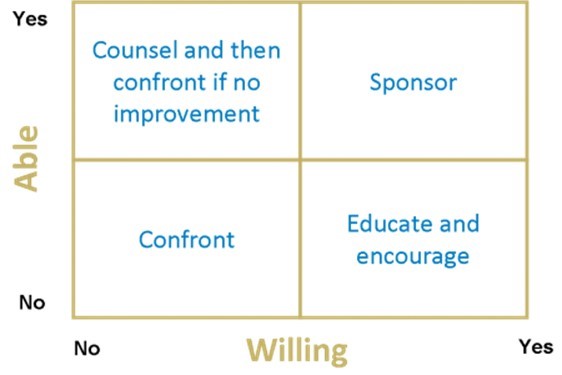The willing and able matrix provides a standard thought-process to managing performance.

Willing and Able
Sponsor people who are willing and able to help them further their development as a person and as an organisational resource. This includes, but is not limited to:
- Assignments in different functions of the business.
- Membership of cross-functional project teams tackling difficult issues.
- Elite training programmes.
- Control over assignments in their area of expertise with stretch targets.
- Relieving duties for more senior managers while they are absent for extended periods of time.
- Assignment of a mentor.
Willing but Unable
Educate and encourage people who are willing but unable to complete more difficult activities. This includes, but is not limited to:
- Corporate training programmes.
- On-the-job training programmes.
- Assessment of knowledge and practical execution of processes and procedures to understand knowledge and skills gaps.
- Assignment of a coach to coach in skills and provide a role model for behaviour.
- Provision of reading materials assessed s being relevant to the behaviours required for their role.
Able but Not Willing
Counsel those who are able but not willing to use their talents and skills to make a better life for themselves and a better outcome for the organisation. If that does not work after several tries, move to confrontation. This includes, but is not limited to:
- Seeking understanding of their interests to ensure that they are in roles that match their interests. It is much easier to build skills when you are in a role that matches your interests.
- Determining if there are blockers to their performance and agree where possible to remove those blockers in return for a concerted effort to improve their performance.
- Determining if they feel valued or not and seek to improve their perception of their value.
- Agreeing on an action plan of mutually agreed actions to improve performance. If repeated attempts to execute an action plan results in insufficient improvement in behaviour and performance move to confronting them on their behaviour and ask them “What are you going to do about your problem?”, passing ownership of the problem from a joint between you and the employee to them alone.
Unable and Unwilling
Those who have shown themselves to be consistently unwilling and unable or have done so through an act resulting in extremely mediocre performance or grossly affecting the performance of others, must be confronted with their behaviour leading to the mediocre performance and asked what they will do to correct their behaviour. This includes, but is not limited to:
Having a one-on-one meeting with the person and developing an action plan with clear timelines of what they will do to improve their performance with equally clear consequences for not doing so.